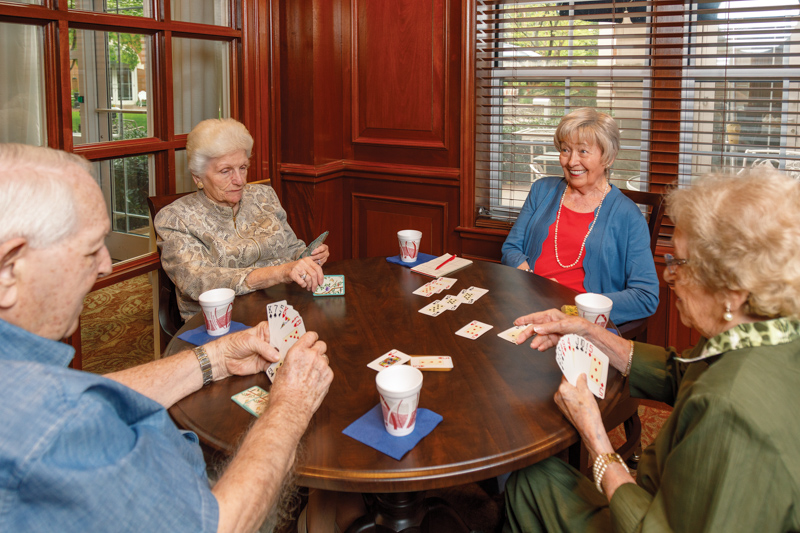Stress Management Tips for Seniors and Their Families
Every individual experiences stress, and seniors are no exception. But we often forget that over time, stress can seriously impact our mental and physical health.
In honor of National Stress Awareness Month, we wanted to share some practical information about how to identify and manage stress in your own life and in the lives of the seniors you love.
Common Sources of Stress in Seniors
Whether it’s about world events, personal relationships, work, or money, Americans on average experience much higher stress levels than the rest of the world. 55% of Americans report feeling stressed during the day, compared to 35% of people globally.
For seniors, in particular, common sources of stress include:
- Changing relationships with family
- Death of loved ones
- Loss of ability to be active or complete normal daily tasks
- Loss of routine in retirement
- Moving or transitioning into senior care
Health issues are an especially common source of stress for seniors. In a Statista study, older adults who reported having “poor health” were stressed at higher rates than those who reported having “excellent health” (37% vs. 12%).
In spite of all these factors, seniors tend to experience lower rates of stress than younger adults, but when they do experience stress, they’re more vulnerable to it and to its physical effects.
How Stress Affects the Body
Stress is a natural part of life, and it’s actually a protective mechanism to help our bodies respond to danger. But when the body continues to release stress hormones over a long period of time, it can cause a wide range of health issues.
Chronic stress can impact nearly every part of the body and may increase a person’s risk for issues including:
- Heart conditions
- Digestive issues
- Muscle tension and pain
- Hormone imbalance
- Breathing troubles
- Weakend immune system
Stress also affects a person’s mental health, and periods of prolonged stress may lead to anxiety, depression, irritability, memory troubles, and more.
Helping Your Loved One Manage Stress
If your loved one is experiencing increased stress levels because they’re adjusting to life in senior care, recovering from an illness or grieving the loss of a loved one, strong support from friends and family can be a key factor that helps them stay mentally and physically healthy. Frequent visits, or even phone calls, can help your loved one feel connected to the world and remind them that they’re not alone.
Any form of physical activity can also serve as a valuable stress-fighting tool. Whether that looks like going on walks at their independent living facility or attending physical and occupational therapy sessions in a skilled nursing center, encourage your relative to find a type of movement that is safe and comfortable for them.
Other tactics for relieving stress include:
- Eating a healthy, balanced diet
- Participating in group activities
- Getting help with daily tasks that may be causing unnecessary stress
- Finding a therapist or support group to talk to
- Keeping a daily gratitude list
- Creating a consistent sleep schedule
- Enjoying hobbies like reading books, watching TV, or listening to music
Stress Management Happens Best in Community
Helping your loved one stay physically and mentally healthy can feel like a full-time job, but you are not alone!
When your loved one moves to an NHC facility, you can trust that they’ll be cared for by a team of experts who are committed to helping them find as much health and happiness as possible. Our centers are designed to help reduce patient and resident stress, with delicious, healthy food, frequent activities, and a dedicated care team who can help your patient identify and reach their goals.
Find a community in your area today to learn more!



Recognizing Signs During the Holidays That Your Loved One May Need Assisted Living
AdamsPlace, Cavette Hill, Colonial Hill, Dickson, Family Resources, Heartland ALF, Lake St. Charles, Lakeshore Heartland, Meadows ALF, NHC Place Anniston, NHC Place at the Trace ALF, NHC Place Cool Springs ALF, NHC Place Farragut ALF, NHC Place Sumner ALF, Palmettos of Bluffton, Palmettos of Charleston, Palmettos of Garden City, Palmettos of Mauldin, Palmettos of Parklane, Parkwood, Richland Place, Villages of Jackson Creek, Villages of St. PetersSpending time with family during the holidays can be the highlight of the season. However, it can also be a time when you may notice changes in your loved one that raise concerns about their well-being. It’s essential to be mindful of signs that may indicate a need for additional support or even assisted living. […]
Comfort and Joy: Easing Holiday Stress for Seniors
Family ResourcesThe holiday season is often hailed as a time of joy, family gatherings, and festivities. However, for seniors, it can also bring about stress and anxiety. Your loved one may find themselves overwhelmed during this time of the year. In this blog post, we’ll explore practical and thoughtful ways to help reduce stress for seniors, […]
Finding Seniors Ways to Save
Family Resources